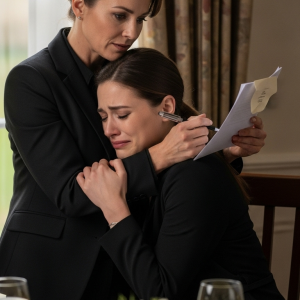My mother has misophonia, a condition where certain sounds can trigger an intense, visceral reaction. For most, it’s an aversion to chewing or tapping. For my mother, it was a trigger for a rage so profound it made her self-destructive. My first memory is not of a lullaby or a bedtime story, but of a dirty, sour-smelling dish towel being stuffed into my six-year-old mouth. In her defense, as she later explained, I was crying my eyes out after a simple fall on the pavement, and the sound was unbearable.
This was the foundation of my childhood: her condition, my silence. If I snored too loudly, she wouldn’t gently wake me; she would blast a deafeningly loud sound horn in my room until I jolted awake, my heart hammering in my chest. This, she explained, was “negative reinforcement” to condition my “bad behavior.” I ought to thank her, she said, for making it easier for me not to do it again.
On my ninth birthday, she gave me my gift. It was a homemade report card, the rows completely empty. She called it the Quiet Points System. For the weeks leading up to this, she had been labeling all the food in the kitchen with sticky notes bearing numbers. A slice of bread was two points. A piece of fruit was three. Meat was at least ten. You earned points by being quiet. Being quiet while I showered was worth three points. Not snoring through the night was worth eight. My silence was now a currency, and food was the commodity.
At the time, I was just a nine-year-old with big brown eyes who loved her mommy. I didn’t understand the insidious nature of the system she had created. I just shrugged, wrapped my arms around her, and didn’t say a word, so as not to trigger her.
The next morning, I woke up and followed my new routine. I drew back the curtains with painstaking slowness to avoid the swish of the fabric. I waited until I arrived at the school bathrooms to change out of my pajamas, the fabric of my school uniform rustling too loudly for our silent home. I moved through my own house like a ghost, my face a permanent grimace of concentration.
Apparently, this pleased my mother. When I got home from school, she handed me the report card. In big, bold lettering, it said: +30 POINTS. It was followed by a constellation of smiley faces and hearts. Before I could say anything, she opened the fridge and showed me the selection I could now “afford” for dinner. I had earned enough for almost everything except my favorite ice cream. I chose the steak.
She made the steak extremely overcooked, a leathery slab of meat that was impossible to swallow without chewing hard. And for a person with misophonia, mouth sounds were, as she put it, “deadly.” I tried to chew with agonizing slowness, trying to produce enough saliva to break down the meat. After five minutes of this painful process on a single piece, I couldn’t take it anymore. I discreetly spit the mangled piece into a tissue, deciding I would rather eat nothing.
But she was watching. “What on earth are you doing?” my mother yelled, her voice cracking the silence. “A cow died for you today. The least you can do is eat it. Put it back in your mouth. Now.”
My tiny, trembling fingers unraveled the tissue and shoved the cold, chewed-up meat back into my mouth. On the way in, my tongue made a soft smacking sound against the roof of my mouth. I froze, hoping she hadn’t noticed. It was too late.
The room was silent as she banged both her fists against the flowery tablecloth. “You disgraceful child!” she shrieked at the top of her lungs. She snatched the report card from me and held it over the open flame of the stove, the smiley faces curling into black ash. “You think I can’t make you suffer the same way you make me suffer? Think again.”
She grabbed my hands and shoved them toward the stove. “The burning pain you feel,” she said, her face inches from mine, her voice a low, terrifying hiss, “is only twenty percent of how I feel when you make noise. Remember that.” She never actually put my hands in the fire, but the searing heat brought tears to my eyes. I didn’t cry out. I didn’t sob. The training was too deep. Noise brought punishment. I quietly tiptoed to bed and had oxygen for dinner. And for breakfast, and lunch, and dinner again the next day. That one sound had put me deep into the negative zone on my meal points. I had nothing to buy food with.
Unlike other abusive parents, my mother wasn’t careful to keep up appearances of my health. After three days of pure starvation, I fainted during class at school. It was only for about twenty seconds, but when I woke up, the first thing I said, my voice hoarse, was, “I’m sorry. I didn’t mean to fall so loudly. Please don’t starve me anymore.”
The guidance counselor, a kind woman named Mrs. Henderson, pulled me into her office. Her hands shook as she handed me a chocolate bar, a banana, and a granola bar. I devoured them so quickly I was gagging. When I was done, I looked up at her. Her face was ghost white, her eyes filled with tears. She didn’t ask any more questions. She just picked up the phone and called Child Protective Services.
“Yes, this is Mrs. Henderson at Oakwood Elementary,” she said, her voice cracking. “I need to report a case of suspected child abuse and neglect.”
While she was on the phone, I sat completely still, my body’s training overriding everything else. Stillness meant safety. Sound meant pain. When a woman from CPS, Ms. Rodriguez, arrived, I repeated the whole story—the points system, the steak, the stove. They took me to the school nurse, who documented my weight—severely underweight—and the dark circles under my eyes. Then my mother arrived.
Her voice, when I heard it through the closed door of the conference room, was her fake nice one, the one she saved for other adults. “I’m sure this is all a misunderstanding. My daughter has such an active imagination, you know.”
They sent me home with her that night. It was the law, Ms. Rodriguez explained, her face full of an apology she couldn’t voice. Without immediate evidence of physical abuse, she couldn’t legally remove me from the home. My mother had cleaned the house. The point chart was gone. The sticky notes were gone. The fridge was fully stocked. She had even produced faked medical records indicating I had a rare eating disorder and that she had been desperately trying to get me help.
The drive home was silent, a terrifying quiet that promised a storm. “You’ve made things very difficult,” she said, her voice deadly calm as she pulled into our driveway. “But don’t worry. I have a solution.”
The solution was a pair of noise-canceling headphones and a white noise machine. “Your new therapist recommended these,” she said, though I knew there was no therapist. “Doctor’s orders. For your… sensory processing disorder.” She put them on my head and turned on the white noise. The world disappeared into a rushing, hissing static, like an endless ocean wave. I couldn’t hear her footsteps. I couldn’t hear her breathing. I couldn’t hear anything but the white noise. If I tried to take them off, she would appear, pointing to a faked doctor’s note she had created. If you don’t follow treatment, it’s medical non-compliance. That would look very bad for your little CPS friends.
The headphones became my new prison. I wore them at all times, except for meals. The constant pressure gave me headaches. My ears rang in the brief moments of silence. At school, I moved through the halls like a zombie, too exhausted and disoriented to focus. My mother, meanwhile, had begun volunteering at the school, filing papers in the main office, answering phones, making herself indispensable. She was always watching.
I knew I needed help, but every adult I might turn to was being systematically manipulated. Then, during math class, I noticed a new substitute teacher, a young woman with short dark hair and observant eyes. I started tapping my pencil on my desk—short taps and long taps, a pattern from an old war movie. Morse code. S-O-S. The substitute, Miss CB, paused mid-equation. Her eyes found mine. After class, she kept me back and wrote on a piece of paper: Are you okay? My hand shook as I took the pencil and tapped out my reply on the paper: M-O-M.
A few days later, a folded note appeared under my paint palette in art class. It was from Miss CB. Your mother visited my apartment. She knows where I live. I’m sorry. My mother had found my one potential ally and neutralized her.
The abuse escalated. My mother started what she called “family therapy sessions” with a new, equally fake therapist, Dr. Klouse. In these sessions, she would play edited audio recordings of me supposedly slamming doors and screaming, fabricating a narrative of me as an aggressive, defiant child. Dr. Klouse, either a fool or a co-conspirator, ate it up. He prescribed medications that made me foggy and recommended “more intensive interventions.”
The pills, combined with the constant white noise, wrapped my world in a thick cotton. Days blurred into a haze of muffled sound and sticky, slow thoughts. My mother installed cameras in my room “for my safety.” Then came the soundproof closet. She had built it in the basement, a small, dark, padded cell with a lock on the outside.
“Dr. Klouse agrees you need a more intensive intervention,” she said calmly. “This is a safe space for you to work through your behaviors. We’ll start with two hours.” The door closed. The lock clicked. The darkness and absolute silence swallowed me whole. I screamed until my throat was raw, but I couldn’t even hear myself.
During a particularly bad week, when I could barely walk straight from the medication, the fire alarm went off at school. The sudden, piercing noise sent a shock through my system, and I collapsed. I woke up in the hospital. The beeping of the machines was the first clear sound I’d heard in months. A new doctor, Dr. Sarah, was examining me. My mother was there, of course, with her well-rehearsed story about me hoarding my medication. Dr. Sarah seemed to believe her.
But in that hospital, I found my last hope. One night, a different nurse, an older woman with tired, gray hair, slipped into my room. “I don’t have long,” she whispered. “But I knew your friend, the substitute teacher. She asked me to give you this.” She pressed a small piece of paper into my hand. It was a phone number. “Call it when you can,” she said. “There are more of us than you think. Women who’ve seen what happens at that clinic your mother is connected to. We’ve just been too scared to speak up.”
My mother, sensing she was losing control, made her final move. The night after I was discharged, she woke me up, dragged me to the car, and drove for hours. We arrived at dawn at a large building surrounded by high walls. It looked more like a prison than a treatment center. “Welcome to Peaceful Meadows,” a nurse said, taking my arm. My mother signed some papers, told me to “be good,” and drove away without a backward glance.
The doors locked behind us. This wasn’t a treatment center; it was a warehouse for unwanted kids. My room was a small, white, empty cell. The days passed in a medicated blur of silent meals and group therapy where no one was allowed to speak. I was sure I had been forgotten.
Then, one day, chaos erupted. I woke to the sound of sirens, lots of them. My door flew open. It was a different nurse, a new one I’d seen recently. “We have to go. Now,” she said, pulling me into the hallway. Staff members were running everywhere, shredding documents. Outside, police officers were streaming into the building, leading dazed children into ambulances. The new nurse led me to an unmarked van. Mrs. Henderson, the guidance counselor, was behind the wheel.
“Miss CB found the records,” she explained as we sped away. “Your mother had done this before. A boy named Marcus. He was in that place for three years before he aged out of the system.”
My mother was arrested that morning. The police found the soundproof closet, the doctored recordings, everything. Dr. Klouse, too. It turned out he’d been taking bribes from wealthy parents to have their “difficult” children committed.
I was placed in the care of my aunt, my mother’s sister, who had apparently been searching for me since my disappearance. She was nothing like my mother—warm, loud, and constantly encouraging me to make noise, to take up space, to simply exist without fear. The recovery was not easy. Years of conditioning don’t just vanish overnight. For months, I still flinched at sudden sounds, caught myself walking on tiptoes, and sometimes reached for headphones that were no longer there. But slowly, with real therapy and unwavering patience from my new family, I began to heal.
I learned to speak above a whisper. I joined the school choir, a decision that felt like a radical act of rebellion. I surrounded myself with music and laughter and all the beautiful sounds my mother had forbidden. Mrs. Henderson visited regularly, bringing cookies and a comforting sense of normalcy. Miss CB, whose real name I learned was Claire and was a former military intelligence officer, helped me with my Morse code, turning a skill born from trauma into something I could be proud of. Ms. Rodriguez from CPS checked in, her determination to prevent other children from falling through the cracks a tangible force for good.
The day I testified at my mother’s sentencing, I spoke clearly and loudly. I looked her directly in the eye as I described the Quiet Points system, the starvation, the headphones, and the soundproof closet. I told the court about the years of torture she had disguised as parenting. She tried to interrupt, to spin one last, desperate lie, but the judge cut her off. “I’ve heard enough,” he said, his voice grim. “The evidence is overwhelming.”
She was convicted on all charges—child endangerment, false imprisonment, conspiracy. She was sentenced to twenty-five years in prison. Dr. Klouse got thirty. The facility was shut down for good, its operators arrested. As they led my mother away, she turned to look at me one last time. I didn’t flinch. I didn’t go silent. I stood tall and watched her disappear into the very system she had tried to trap me in.
That night, my aunt made my favorite dinner: steak, cooked medium-rare, so tender you could cut it with a fork. We ate together, talking and laughing, filling the house with all the wonderful, chaotic sounds of a real, loving family.
I started tenth grade at a new school where nobody knew my story. I made friends who didn’t understand why I got so happy about simple things like humming in the hallway or tapping my pencil during tests. The nightmares began to fade. The flinching stopped. I learned to trust adults again, to ask for help without fear of punishment, to exist loudly and proudly in a world that no longer demanded my silence.
On the one-year anniversary of my rescue, I got a letter from Marcus, the boy who had been imprisoned at Peaceful Meadows before me. He thanked me for being brave enough to signal for help, for breaking the cycle that had trapped him. He was in college now, studying social work, determined to help kids like us. I wrote back, telling him about my new life, how I had joined the drama club and the debate team—anything that required me to use my voice.
The investigation ultimately revealed that my mother had never actually had misophonia. It was all an elaborate, pathological excuse for control, a way to justify her sadistic need to dominate and silence. She had failed. I was still here, still breathing, still speaking, still making all the beautiful noise I wanted. On my eighteenth birthday, I stood in my aunt’s kitchen, surrounded by friends and my chosen family. As they sang “Happy Birthday” loudly, joyfully, and beautifully off-key, I closed my eyes and let the sound wash over me, a wave of pure, unadulterated freedom. I was free.




